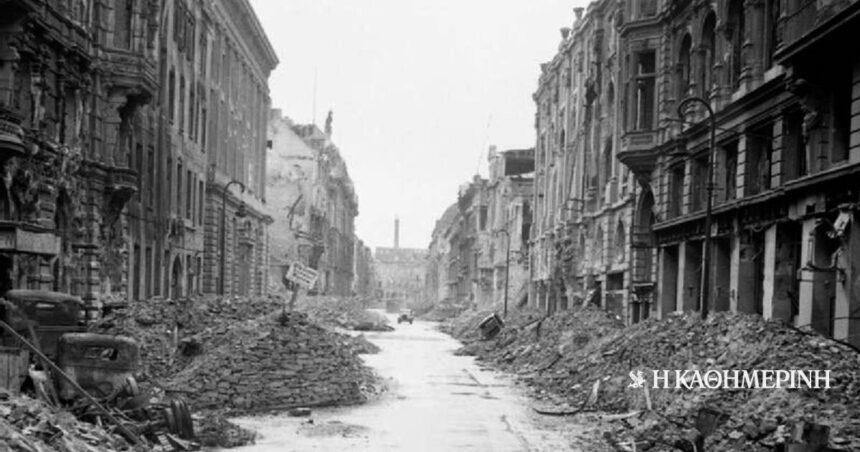OR Strategy of “Burnt Earth” It is a war tactic that has been implemented for centuries, with the aim of weakening the enemy through the destruction of resources that could be useful. Includes destruction of agricultural land, infrastructure and other vital resourcesso that the opponent cannot use them to support his troops. One of the first times we meet it is in the work of Xenophon “Cyrus Anavassis”. It states that Artaxerxes’ men burn crops and destroy food supplies during their retreat in order to prevent Greek mercenaries who are fighting on the side of Cyrus to use them.
Even if it seems anachronistic, in fact this tactic has not stopped being used. During the World War IIthis tactic reappeared in various forms, with a more extreme example of the so -called Decree “Nero” by Adolf Hitler.
Hitler believed that an unconditional tradition would repeat the humiliation of the Versailles Treaty.
In early 1945, the situation for the Germany It was hopeless. Most conquered areas had been liberated or recaptured, the attack on Ardennes had failed and the allies were promoting both from the East and the West. However, Hitler was not prepared to accept unconditional tradition, as he believed that this would repeat the humiliation of the Treaty of Versailles. In addition, according to the testimonies of the associates of the associates, had begun to see the German people as unworthy of his historical missionbelieving that if he had failed to win, he deserved to disappear with the Third Reich.
Thus, on March 19, 1945, the German Chancellor published “Decree on Reich territory(Befehl Betreffente Zerstörungsmaßnahmen Im Reichsgebiet), which commanded a complete destruction of German infrastructure, so as not to fall into the hands of the allies. Roads, bridges, rail networks, factories and energy sources had to be blown up or destroyed, leaving behind a ravaged place. Hitler believed that if Germany was to be defeated, he should not have left anything behind the winners.
“We need to take every opportunity to cause enduring damage to the enemy’s staff capacity to attack.”
“The struggle for the survival of our nation forces us to use all the means, even within the Reich territory, that will weaken the martial power of our opponent and prevent further advance. We need to take every opportunity to cause endurance damage to the enemy’s staff capacity to attack. It is wrong to believe that non -damaged transport, communications and supply facilities will be useful to us after recapturing lost territories. In his retreat, the enemy will leave behind only burnt land and abandon any welfare for the population.
Consequently I order:
1. All military transport, communications, industry and supply facilities as well as military targets within Reich’s territory, which could be used by the enemy to continue his struggle either now or later, will be destroyed.
2. It is the responsibility of the military authorities to execute this order and to destroy all military targets, including transport and communications facilities.
The “Gaoulaiter” and the “Reich Defense” are responsible for the destruction of industry and supply facilities, as well as other military targets; the troops must give the Reich Defense and Defense Commissioners to fulfill this task.
3. This order to be transmitted to all military commanders as soon as possible; opposite orders are invalid. “
The Minister of Equipment and Ammunition ordered officials and commanders to delay or ignore orders.
But the application of the decree was not as simple as Hitler might think. Albert Spear, Minister of Equitations and Ammunition, strongly opposed these orders. He knew that Germany already suffered from the advance of allies and that Infrastructure destruction would condemn the population to famine and poverty. Although Hitler never recalled the order, Speer sought to undermine her. He ordered officials and military commanders to delay or ignore destruction orders, saving important infrastructure, such as bridges, factories and hydroelectric installations.
This was not the first time that Speer bypassed destruction orders. In 1944, when the allies were predicted to FranceHitler ordered the destruction of the French industry to make it useless to the allies. Spear, however, also resisted this time, allowing critical industrial facilities to be maintained. The result was that the French economy quickly recovered after the war, as opposed to the chaos that Hitler wanted to leave behind.
Hitler’s mentality was that if Germany could not win, then it was not worth surviving.
If the “Nero” decree had been fully implemented, post -war Germany would have been in complete collapse. Hunger, diseases and lack of roofing would have cost millions of lives, making recovery almost impossible. The resistance of Spear and other officials saved the country from a total disaster and allowed post -war reconstruction. On the other hand, the “Nero” decree proves Hitler’s mentality in the last days of war: if Germany could not win, then it was not worth surviving.
Column: Myrto Katsigera, Vassilis Minakakis, Antigoni-Despina Poumenidou, Athanasios Syroplakis








